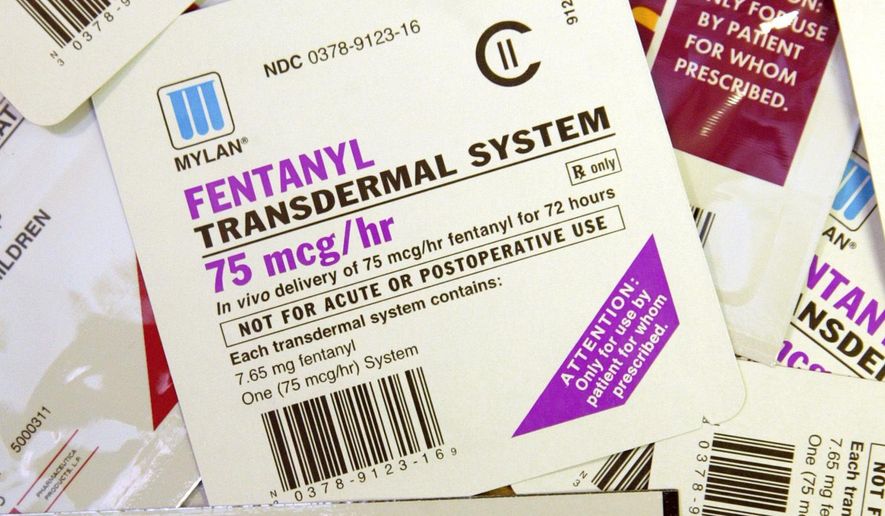A top federal prosecutor told Congress on Wednesday that the law needs to be changed so trafficking even small amounts of deadly fentanyl earns serious jail time.
Christina E. Nolan, the U.S. attorney in Vermont, said the drug is so toxic that small amounts are killing people — yet a dealer would have to sell 40 grams, equivalent to 20,000 lethal doses, to earn a mandatory prison term, and prosecutors rarely see cases that reach that threshold.
“Fentanyl is a new kind of threat. It is a new kind of danger,” Ms. Nolan told the Senate Judiciary Committee. “The 40-gram threshold just doesn’t make sense.”
The synthetic was responsible for two thirds of the 107 opioid-related deaths that Vermont saw last year, she said.
The Senate is vetting a GOP bill that would impose a mandatory minimum five-year sentence on someone caught selling 2 grams of pure fentanyl, while a 20-gram load would earn at least 10 years.
Under current law, someone would need to sell at least 20 times those amounts to get those respective terms.
Democrats were wary of the approach.
“Trying to sentence our way out of this didn’t work worth a damn when it came to crack cocaine,” said Senate Minority Whip Richard J. Durbin, Illinois Democrat.
Sen. Lindsey Graham, South Carolina Republican, agreed the nation can’t punish its way out of the crisis, but “it’s a pretty good place to start.”
“If we can drive the drug dealers away from fentanyl, it will be a pretty good thing,” said Mr. Graham, chairman of the subcommittee debating the bill, sponsored by Sen. Tom Cotton.
Fentanyl is flooding the illicit heroin market from clandestine labs overseas, resulting in an overdose crisis that’s killing tens of thousands of Americans per year. Users often consume fentanyl unwittingly, since they’re unable to tell if their heroin is cut with the deadly synthetic.
Dealers are lacing cocaine and marijuana with fentanyl, too, potentially creating a new crop of opioid addicts.
Kenneth C. Miller, chief of police for Greenville, South Carolina, said fentanyl goes beyond the threat of those other drugs. While they carried a risk of death, “fentanyl compounds pose the distinct probability of death,” he said.
President Trump, who declared opioids addiction to be a public health emergency last fall, has pushed for tougher sentences for drug dealers and even the death penalty for “kingpins” who reap huge amounts of cash by peddling deadly substances.
He said countries that have zero tolerance for traffickers don’t have drug problems.
But Dr. Josiah Rich, director of the Centers for Prisoner Health and Human Rights, said harsher penalties will simply sweep up low-level dealers who will be “easily replaced” by others.
Ms. Nolan urged a broad strategy that included new penalties, but also treatment and recovery services for addicted person.
The hearing was one of several events that took aim at the crisis Wednesday.
Administration officials highlighted the D.C. arrival of a traveling memorial to victims of the opioids crisis, while the House Ways and Means Committee released a white paper that said the Medicare program could do a better job of covering medication-assisted treatment for addicted persons and tracking opioid prescriptions.
Across the Capitol, the Senate Health Committee is debating a bill that would spur the National Institutes of Health to develop non-addictive pain relievers, help the FDA detect and seize suspicious drug packages from overseas and allow regulators to require drug makers to package opioid pills in blister packs with limited doses of 3-7 days.
Committee efforts to stabilize Obamacare’s insurance markets fell apart last month, though panel leaders said they’re confident this bipartisan push has broad support and will help reverse the crisis.
“This bill is a testament to the value of listening, and we’re not done listening yet,” said Sen. Patty Murray of Washington, the panel’s ranking Democrat.
• Tom Howell Jr. can be reached at thowell@washingtontimes.com.




Please read our comment policy before commenting.